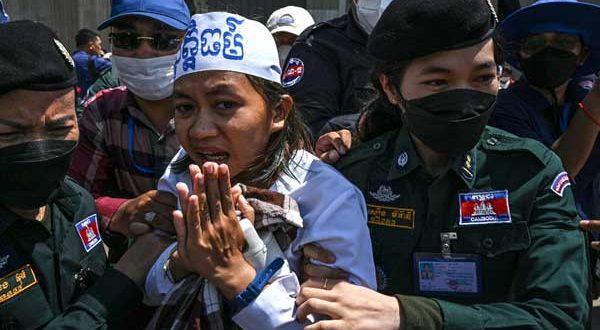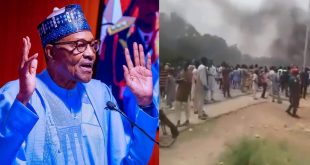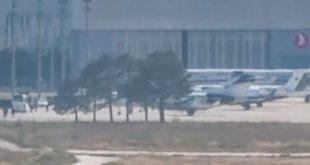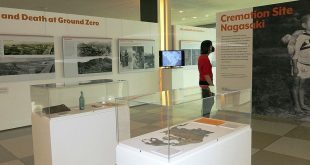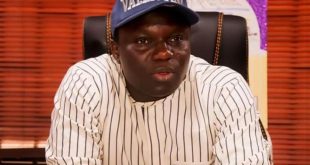
LONDON, Aug 01 (IPS) – It’s risky to try to protect the environment in authoritarian Cambodia. Ten young activists from the Mother Nature environmental group have recently been given long jail sentences. Two were sentenced to eight years on charges of plotting and insulting the king. Another seven were sentenced to six years for plotting, while one, a Spanish national banned from entering Cambodia, was sentenced in absentia.
Four of the activists were then violently dragged away from a peaceful sit-in they’d joined outside the court building. The five who’ve so far been jailed have been split up and sent to separate prisons, some far away from their families.
This is the latest in a long line of attacks on Mother Nature activists. The group is being punished for its work to try to protect natural resources, prevent water pollution and stop illegal logging and sand mining.
The more you repress us, the more resolute our fight to protect #Cambodia ‘s nature will be.
The more you to try to break our spirit, the stronger we will be.
Ratha, Kunthea, Daravuth, Akeo and Leanghy: We love you & respect your immense sacrifices. #FreetheMotherNature5pic.twitter.com/2CoMwyHpjw
— Mother Nature Cambodia (@CambodiaMother) July 3, 2024
An autocratic regime
Cambodia’s de facto one-party regime tolerates little criticism. Its former prime minister, Hun Sen, ruled the country from 1985 until 2023, when he handed over to his son. This came shortly after a non-competitive election where the only credible opposition party was banned. It was the same story with the election in 2018. This suppression of democracy required a crackdown on dissenting voices, targeting civil society as well as the political opposition.
The authorities have weaponised the legal system. They use highly politicised courts to detain civil society activists and opposition politicians for long spells before subjecting them to grossly unfair trials. Campaigners for environmental rights, labour rights and social justice are frequently charged with vaguely defined offences under the Criminal Coder such as plotting and incitement. Last year, nine trade unionists were convicted of incitement after going on strike to demand better pay and conditions for casino workers.
In 2015 the government introduced the restrictive Law on Associations and Non-Governmental Organisations (LANGO), which requires civil society organisations to submit financial records and annual reports, giving the state broad powers to refuse registration or deregister organisations. In 2023, Hun Sen threatened to dissolve organisations if they failed to submit documents.
The state also closely controls the media. People close to the ruling family run the four main media groups and so they mostly follow the government line. Independent media outlets are severely restricted. Last year the authorities shut down one of the last remaining independent platforms, Voice of Democracy. Self-censorship means topics such as corruption and environmental concerns remain largely uncovered.
This extensive political control is closely entwined with economic power. The ruling family and its inner circle are connected to an array of economic projects. Landgrabs by state officials are common. These means land and Indigenous people’s rights activists are among those targeted.
In 2023, courts sentenced 10 land activists to a year in jail in response to their activism against land grabbing for a sugar plantation. That same year, three people from the Coalition of Cambodian Farmer Community, a farmers’ rights group, were charged with incitement and plotting. The LANGO has also been used to prevent unregistered community groups taking part in anti-logging patrols.
The activity that saw the Mother Nature activists charged with plotting involved documenting the flow of waste into a river close to the royal palace in the capital, Phnom Pen. It’s far from the first time the group’s environmental action has earned the state’s ire. The government feels threatened by the fact that Mother Nature’s activism resonates with many young people.
Three of the group’s activists were convicted on incitement charges in 2022 after organising a protest march to the prime minister’s residence to protest against the filling in of a lake for construction. In 2023, Mother Nature delivered a petition urging the government to stop granting land to private companies in Kirirom National Park; there’s evidence of licences going to people connected to ruling party politicians. In response, the Ministry of Environment said Mother Nature was an illegal organisation and that its actions were ‘against the interests of Cambodian civil society’.
Media also get in trouble if they report on the sensitive issue of land exploitation. In 2023, the authorities revoked the licences of three media companies for publishing reports on a senior official’s involvement in land fraud. In 2022, two teams of reporters covering a deforestation operation were violently arrested.
Regional challenges
Repression of environmental activism isn’t limited to Cambodia. In neighbouring Vietnam, the one-party communist state is also cracking down on climate and environmental activists. In part this is because, as in Cambodia, climate and environmental activism is increasingly shining a light on the environmentally destructive economic practices of authoritarian leaders.
Cambodia’s creeping use of the charge of insulting the king to stifle legitimate dissent also echoes a tactic frequently used in Thailand, where the authorities have jailed young democracy campaigners for violating an archaic lèse majesté law that criminalises criticism of the king. Other repressive states are following its lead – including Cambodia, where the law on insulting the king was introduced when the crackdown was well underway in 2018.
Cambodia provides ample evidence of how the denial of democracy and the repression that comes with it enable environmentally destructive policies that further affect people’s lives and rights. The solution to protect the environment and prevent runaway climate change is less repression, more democracy and a more enabled civil society.
Cambodia’s international partners should emphasise this in their dealings with the state. They should press the authorities to release the jailed Mother Nature activists, who deserve to spend the coming years helping make their country a better place, not rotting in prison.
Andrew Firmin is CIVICUS Editor-in-Chief, co-director and writer for CIVICUS Lens and co-author of the State of Civil Society Report.
© Inter Press Service (2024) — All Rights ReservedOriginal source: Inter Press Service
 Top Naija News – Nigeria News, Nigerian News & Top Stories Top Naija News – Nigerian Newspapers, Nigerian News. topnaijanews is a daily Nigerian newspaper covering Latest News, Breaking News, Entertainment, Sports, Lifestyle and Politics.
Top Naija News – Nigeria News, Nigerian News & Top Stories Top Naija News – Nigerian Newspapers, Nigerian News. topnaijanews is a daily Nigerian newspaper covering Latest News, Breaking News, Entertainment, Sports, Lifestyle and Politics.
